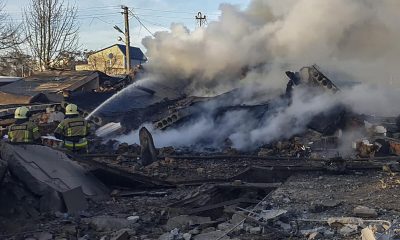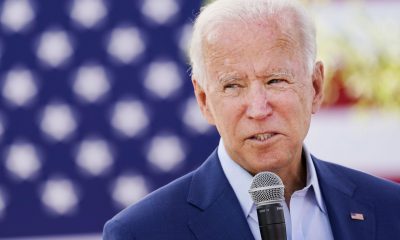International
Putin’s Invasion of Ukraine Creating a World Food Security Catastrophe

As Vladimir Putin’s brutal assault on Ukraine presses forward, the devastating impacts of war are rattling the most vulnerable corners of the world, driving millions toward starvation.
In Ukraine, tens of thousands remain trapped without access to food and water. Beyond its borders, millions more are teetering on the edge of famine.
“We are on a countdown to catastrophe,” David Beasley, executive director of the U.N. World Food Programme said, “and we are running out of time to avoid it.”
Ukraine has long been known as ‘the breadbasket of Europe,’ and is one of the top three grain producers in the world, according to Farming Life. Russia and Ukraine together account for nearly one third of the world’s traded wheat and 12% of its calories, National Geographic reported, with some 26 countries relying heavily on both nations for food security.
But as Russia’s attack on its neighbor has all but shut down grain exports from the region, both vital supply chains have been shattered. Without them, food prices and shortages are spiraling, and the world is left to face its greatest food crisis since the last great war.
Beasley said the war in Ukraine has created “a catastrophe on top of a catastrophe,” and will have a global impact “beyond anything we’ve seen since World War II,” according to Time,
READ ALSO:
- Train attack: Five more passengers found safe, 141 others unknown, another coach recovered
- Malami declares intention to contest for Kebbi State governor
- Pastor demolishes church after catching wife kissing his assistant
The ripple effects of this war will devastate already vulnerable countries like Afghanistan, Foreign Policy reported, where millions of people don’t have enough food and babies are dying of malnutrition.
“With each month that goes by, more Afghans are forced to resort to the unimaginable to survive,” Amanda Catanzano, the International Rescue Committee’s acting vice president of policy and advocacy, said, according to USA Today.
“Parents are being forced to make decisions no one should have to consider,” she added, “including selling off young daughters, so they can buy food for the rest of their children.”
In the Middle East, millions of people whose lives have already been turned upside down by violence, displacement and poverty, AP reported, are left wondering where their next meal will come from.
“We can’t forget that these multiple hunger crises are going on at the same time,” Danielle Nierenberg, president of Food Tank, told Newsweek. “One is not more important.”
“Right now,” she added, “the long-term consequences are what I’m most afraid for.”
Experts fear that critical humanitarian aid may be diverted from the Middle East and North Africa in an effort to support the equally dire crisis in Ukraine, the consequences of which could be deadly.
“For the millions of Palestinians, Lebanese, Yemenis, Syrians, and others who live in countries experiencing conflict, catastrophic economic meltdowns, and increasing humanitarian needs,” Carnegie Middle East experts said, “this would be equivalent to shutting down critical life support.”
Joyce Msuya, Assistant Secretary-General for Humanitarian Affairs and Deputy Emergency Relief Coordinator, told the U.N. Security Council that the global impacts of this war are becoming clearer every day.
“Civilians are running out of food, energy and hope,” she added.
Beasley warned the Security Council that the war in Ukraine has turned the country “from a breadbasket to a bread line” for millions of its people, while devastating countries that rely on the region for food security.
His agency was feeding 125 million people around the world before Vladimir Putin’s invasion of Ukraine, Time reported. Due to rising food, fuel and shipping costs increasing the agency’s monthly expenses by $71 million, it has had to start cutting those rations.
In war-torn Yemen, eight million people just had their food allotment cut by 50%, Beasely said, according to Time, “and now we’re looking at going to zero rations.”
READ ALSO:
- How long should vehicle tyres last?
- Tundun MKO-Abiola attacks Hafsat for using their father’s name for Yahaya Bello’s campaign
- FG paid N7.27bn for debt servicing to W’Bank, IMF – Report
In Yemen, 31,000 people are currently facing famine-like conditions, according to data from the WFP, and 161,000 people are expected to be at risk come June.
Because of the ongoing assault against Ukraine, Time reported, the WFP will have to abandon services to four million people in other parts of the world.
On February 24, Ukrainians awoke to the sound of bombs exploding as Russia officially declared war against their homeland. In the weeks that have followed, death and devastation have littered the streets of of their homeland — and their farmland.
The country has largely lost access to heat and electricity and is facing severe shortages of food, water and essential medicine. People are sheltering in basements, the Guardian reported, trying to survive without food and drinking melted snow because the water has been cut off.
As a result, millions are making the painful decision to flee their country. But the journey across the border is no less harrowing, and many Ukrainian families are traveling for days without food.
Amid the terror, strangers are increasingly showing up to support Ukrainians — and humanity.
Within hours of the initial invasion, World Central Kitchen (WCK), a not-for-profit non-governmental organization dedicated to providing meals in the midst of disaster, partnered with Ukrainian restaurants, chefs and volunteers from around the world and began serving warm, nourishing meals to Ukrainian refugees.
“Feeding people is what makes sense,” Jose Andres, founder of WCK, told NPR. “Longer tables, people working together to make sure that one plate of food at a time we can bring hope of a better tomorrow.”
Without hesitation, WCK made a promise to continue helping in the best way it knows, ‘with a freshly prepared plate of food,’ for as long as needed.
“I’m still here,” Marc Murphy, executive chef and restaurateur who is working with WCK in Poland, told Newsweek. “I’ve been here almost three weeks now, and I’m not sure when I’m going back.”
The organization has served five million meals across seven countries as part of the Chefs for Ukraine response, Chloe Mata Crane, executive vice president of Baltz & Co, told Newsweek, and is currently serving over 250 thousand meals per day.
When the war broke out, Murphy knew he couldn’t sit on the sidelines as people suffered.
“Eating a meal is a human right,” he said. “I have the skills to cook. I’ve run large kitchens, I’ve done a lot of this stuff. So I thought, ‘maybe I can lend a helping hand.'”
For Andres, food is about far more than just nutrition.
“Food relief is not just a meal that keeps hunger away,” Andres said. “It’s a plate of hope. It tells you in your darkest hour that someone, somewhere, cares about you.”
On one visit to the border with warm stew and hot chocolate, Murphy met three young girls waiting for a ride from a friend of their parents.
“The mom drove them to the border, they walked across and they were waiting,” Murphy said. “Having some stew and waiting. They didn’t even know where they were going.”
“It’s hard to imagine,” Murphy added. “But that’s one story. And you know there’s thousands a day of those stories. That’s the sad part.”
But the aid givers realize they face a daunting task.
“If we end the conflict, address the needs, we can avoid famine, destabilization of nations and mass migration,” Beasley said. “But if we don’t, the world will pay a mighty price.”
“And the last thing [we] want to do,” he added, “is take food from hungry children to give to starving children.”
NEWSWEEK
International
Visa: UK raises salary entry requirement for skilled workers
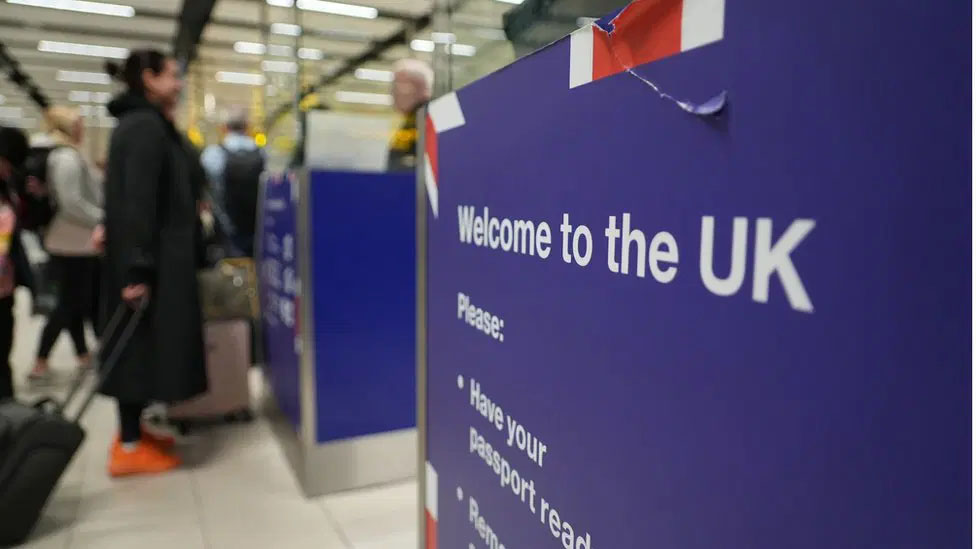
Visa: UK raises salary entry requirement for skilled workers
The UK government has announced an update to its immigration rules, notably increasing salary thresholds for Skilled Worker visas.
This change is targeted at ensuring that only highly skilled and well-compensated workers are able to access the UK job market, with some salary requirements rising by as much as 82%.
Effective from January 1, 2025, the minimum salary for most applicants will rise from £26,200 to £38,700.
This adjustment is projected to impact a wide range of industries, including technology, healthcare, and engineering, making it more challenging for workers to obtain a Skilled Worker visa without a higher-paying job offer.
For applicants with a relevant PhD, the salary threshold will also increase from £23,800 to £34,830, while those holding a relevant STEM PhD will need to meet a higher threshold of £30,960, up from £20,960.
Jobs on the shortage occupation list and new entrants to the workforce will also see their salary requirement increase to £30,960.
READ ALSO:
- Jigawa bride detained after poisoning reception food, groom hospitalised
- How to apply for Germany visa using the new application portal
- Manchester United to use Marcus Rashford in swap deal for Victor Osimhen
“This increase signifies the government’s plan to ensure that only the most qualified individuals can access the Skilled Worker visa programme,” said a government spokesperson.
The raised thresholds are based on median salary figures, which will further narrow the pool of eligible applicants to the highest earners in their fields.
According to DAAD Scholarship, these changes present both challenges and opportunities for job seekers aiming to work in the UK.
“Workers in fields such as software development, engineering, and healthcare will now need to secure job offers that meet the new salary thresholds,” the scholarship noted.
Furthermore, the 20% discount for shortage occupation roles will be removed under the new system.
Visa: UK raises salary entry requirement for skilled workers
International
Two dead after small plane crashes into California building
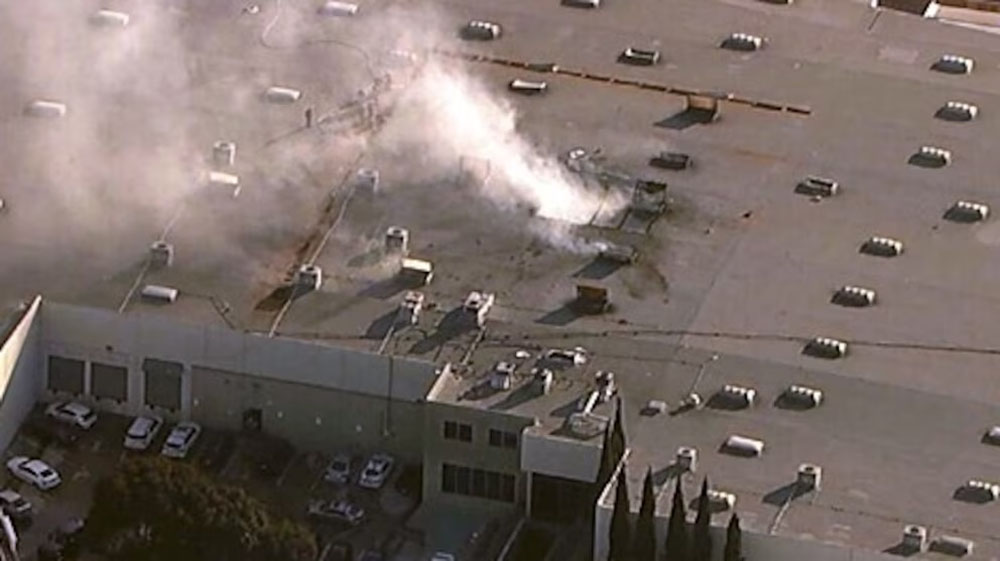
Two dead after small plane crashes into California building
Two people have died and 18 others were injured after a small plane crashed into a commercial building in southern California, officials say.
Ten people were taken to hospital with injuries, the Fullerton Police Department said in a post on X on Thursday afternoon. Eight others were treated for injuries and released at the scene.
The single-engine Van’s RV-10 crashed at 14:15PST (20:15GMT), according to the Federal Aviation Administration.
Officials have provided no further details about how the crash occurred. It is unclear whether the two people who died were workers or were on board the plane.
Police say they are evacuating buildings in the area, and are asking the public to stay away from the crash site.
Congressman Lou Correa, who represents the area of Orange County, about 25 miles (40km) south of Los Angeles, said that the building that was struck is a furniture manufacturing business.
In a post on X, Correa said that at least a dozen of the victims are factory workers.
READ ALSO:
- Vegas Tesla blast suspect shot himself in head – Officials
- Mob lynches woman accused of witchcraft in Benue
- Mosques should be research centres – Varsity don
Aerial photos of the scene show parts of the plane inside the building. The crash also sparked a fire which was extinguished by fire crews.
Security footage recorded from a building across the street shows a fiery explosion, according to local news outlets.
“People are just shaken over the situation,” witness Mark Anderson told KRCA-TV.
“It was just a large boom, and then one of the people went out and said, ‘Oh my gosh, the building’s on fire.'”
The area where the plane crashed is near the Fullerton Municipal Airport, about 6 miles (10 kilometers) from Disneyland.
The plane appears to have been turning back to the airport shortly after takeoff, according to KRCA-TV.
Around 100 people were ultimately evacuated from the Michael Nicholas Designs furniture factory, according to the Orange County Register newspaper.
Juanita Ramirez, an employee, told the newspaper that she heard a loud bang before seeing a large ball of fire flying towards her.
“It felt like a dream,” she said.
This is the second plane to crash in the area in the past two months, according to CBS, the BBC’s US partner.
On 25 November, another plane crashed into a tree roughly one block away from this most recent crash. No major injures were reported in that crash.
Two dead after small plane crashes into California building
BBC
International
Vegas Tesla blast suspect shot himself in head – Officials
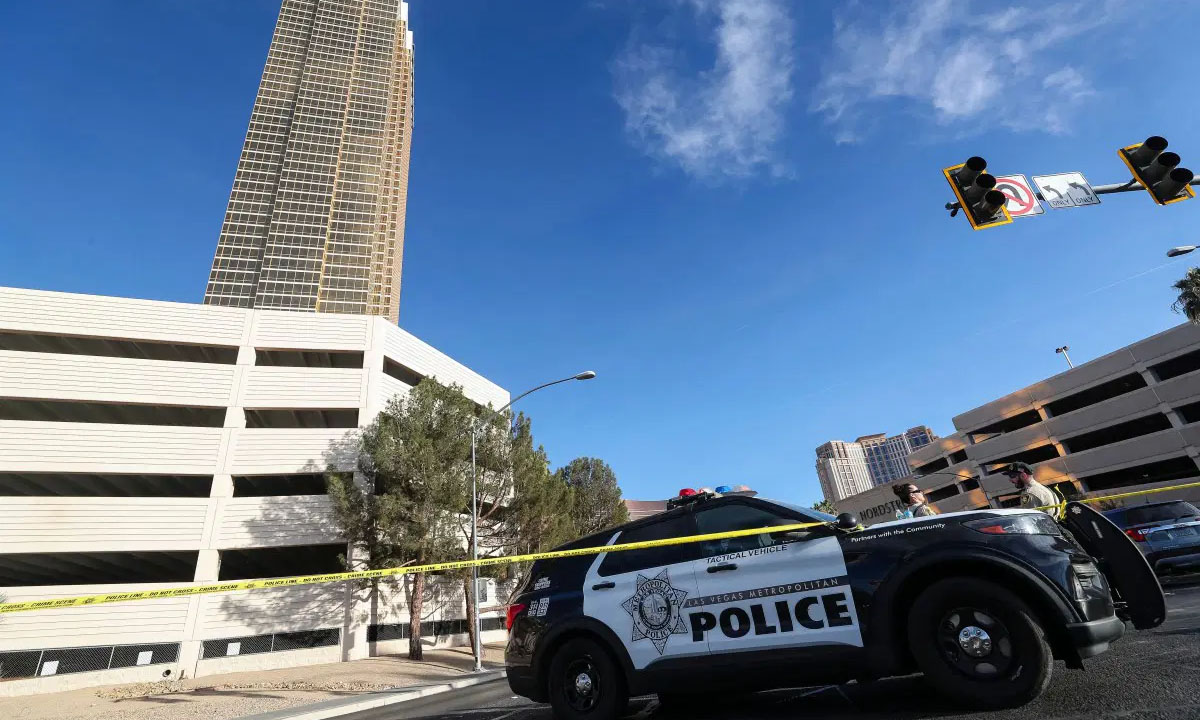
Vegas Tesla blast suspect shot himself in head – Officials
The decorated US special forces soldier who blew up a Tesla Cybertruck outside the Trump International Hotel in Las Vegas apparently shot himself in the head before the blast, authorities said Thursday, adding that his motivation was still “unknown.”
Matthew Livelsberger, 37, a member of the elite Green Berets, appears to have committed suicide in the rented vehicle filled with fuel containers and fireworks, which then erupted into flames, officials said.
Livelsberger’s body was burned beyond recognition but Las Vegas Sheriff Kevin McMahill said the authorities had “a lot of confidence” that he was the sole occupant of the Cybertruck.
Livelsberger, identified through his military ID, passport and credit cards, had a gunshot wound to the head and a gun was found at his feet, McMahill told reporters at a press conference in Las Vegas.
“The motivation at this point is unknown,” FBI Special Agent Spencer Evans said.
Evans said there is “no information that we’re aware of right now that connects this individual to any terrorist organization around the world.”
Kenny Cooper, a special agent with the Bureau of Alcohol, Tobacco, Firearms and Explosives, said Livelsberger had legally purchased two semi-automatic handguns on Monday which were found in the remains of the vehicle.
Video footage outside the Trump hotel shows the stainless steel truck parked at the building’s glass entrance early Wednesday, then bursting into flames, followed by smaller explosions that appeared similar to fireworks.
READ ALSO:
- Mob lynches woman accused of witchcraft in Benue
- Mosques should be research centres – Varsity don
- Panic as huge space object crashes into Kenyan village
Seven people were wounded in the blast.
– No link with New Orleans attack –
The Trump-branded building, which opened in 2008, is part-owned by the Republican president-elect’s family business.
Evans said the link to the president-elect was “not lost” on investigators, nor was the fact that Tesla is owned by world’s richest man — and prominent Trump backer — Elon Musk.
“But we don’t have information at this point that definitively tells us” it was driven by any particular ideology, he said.
Livelsberger rented the vehicle in Colorado on December 28, from where authorities tracked him driving it alone through Arizona and New Mexico to Las Vegas, which he reached on January 1, Kevin McMahill said.
McMahill said Livelsberger was a Green Beret who had been deployed to Afghanistan in 2009 and was currently stationed in Germany.
An army spokesperson said Livelsberger was “on approved leave at the time of his death,” and that he had been awarded multiple Bronze Star Medals, including one for valor.
Investigators said it was not yet clear how the blast detonated, but the components were mainly consumer products like fireworks and fuel.
They said some of the components had not exploded, and that the level of sophistication in the blast was not what they would expect from someone with Livelsberger’s military background.
“I just don’t think it was done as well as he was expecting it to be done,” McMahill said.
The blast came just hours after a pickup truck plowed into a crowd of revelers in the French Quarter of New Orleans, killing at least 14 people and injuring dozens.
Initially investigators were probing potential links between the events, but authorities in New Orleans said Thursday they believe the Islamic State-inspired attacker there acted alone, while the FBI described the Vegas incident as “isolated.”
Vegas Tesla blast suspect shot himself in head – Officials
-

 metro2 days ago
metro2 days ago‘Deepen Shariah knowledge to curb misinformation’
-

 metro2 days ago
metro2 days agoIlorin: Retired works controller murdered on New Year’s Day
-

 metro1 day ago
metro1 day agoJealous husband stabs Bishop to death over allege affair with wife
-

 metro1 day ago
metro1 day agoTinubu’s refusal to honour Seyi’s pact with us disappointing – Nnamdi Kanu’s family
-

 Politics3 days ago
Politics3 days agoHow Tinubu outsmarted Buhari to become president – Ojudu
-

 metro10 hours ago
metro10 hours agoYouths beat Osun monarch for appointing Imam on disputed community
-

 metro3 days ago
metro3 days agoHorror in Ogun as twin brothers kill, dismember sex worker
-

 metro21 hours ago
metro21 hours agoMosques should be research centres – Varsity don

